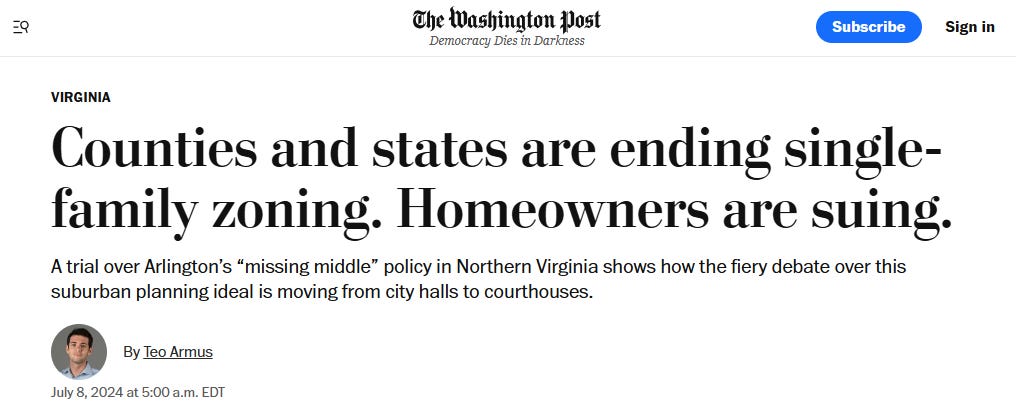We're full
There's a twisted reason that so many well-off people fight against abundant housing.
Some residents of the 10th richest county in the US filed a lawsuit to prevent abundant housing. Single-use zoning is what Rob Henderson calls a Luxury Belief.
Last year, Arlington County approved a measure to legalize "missing middle" housing options for property owners. It took years just to get that far. Now, about a dozen single-family homeowners are in court suing the County to prevent townhomes, duplexes, and garden apartments.
Residents who fight against property rights want you to believe that strict zoning is for the greater good. CBS highlighted reasons for the NIMBY lawsuit:
"The changes to the zoning mean there could be permits to construct more townhouses, duplexes and other multi-residential units on lots that once required only one home." 😢
"[Allowing smaller homes] would negatively affect the tree canopy... elevate the issue of stormwater runoff, increase traffic and real estate taxes." 😢
Single-use zoning confers status on the upper class while often inflicting costs on the lower class.
Here are Henderson’s Golden Rules of Luxury Beliefs illustrated by the Arlington County NIMBY fight against missing middle housing:
RULE #1—PLAY THE VICTIM
"My neighborhood character is ruined!”
"What if they park in front of my house?!"
"Two houses make more noise than one house!"
RULE #2—PROTEST WITHOUT PENALTY
The wealthy can afford to live anywhere (and good for them). The protest against housing is framed as defending the environment, clean air, current neighbors' tastes, greater good, etc.
There's no downside for the wealthy protesting missing middle housing.
RULE #3—PUSH THE LESS PRIVILEGED DOWN
"Just drive out past the Beltway to find something," say NIMBY housing protesters.
Reforming land use regs isn't a handout, it's restoring property rights to existing and future owners. Outlawing housing variety harms the less privileged.
Housing is just one urbanism topic where you can spot Luxury Beliefs, but it's a big one. Shelter is a basic human need, which makes the regulations against housing particularly pernicious.






The NIMBYs in Austin have successfully weaponized the courts here, too, though we've taken some measures to make sure recent reforms are "lawsuit proof"—our "proper steps" included multiple grueling public hearings, at which, of course, the opponents claimed the city had not provided sufficient opportunities for public input. 🙄 Perhaps the silver lining of the NIMBY playbook being apparently the same everywhere is that our defense of housing policies can draw on the success of other cities in allowing more housing and somehow finding ways to handle trees, drainage, and traffic.
We moved from Arlington a month ago. We may move back if we find affordable housing near the Columbia Pike corridor, a multicultural community of immigrants, many of whom are getting priced out of the county and moving west (Fairfax, Loudoun) or south (Prince William, Stafford). Even advocates for these communities wonder if the missing middle initiative, due to Arlington's location and demographics, will not help the "middle" but will favor developers and the lower high-end real estate buyers. The price of a new unit, one of four on a former single-family lot, will still be exorbitant.
One small but promising movement in Arlington have been churches that sell their land to make way for affordable housing or senior living facilities. Sometimes the churches rent back space on the first floors of these new buildings. Our former church has great relationships with some of the tenants of those units and serves them in different ways.